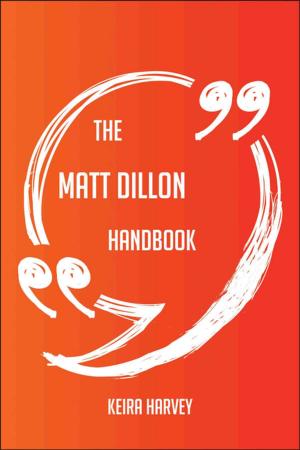Memory - How to Develop, Train, and Use It - The Original Classic Edition
Nonfiction, Reference & Language, Reference, Fiction & Literature| Author: | William Walker Atkinson | ISBN: | 9781486496266 |
| Publisher: | Emereo Publishing | Publication: | March 13, 2013 |
| Imprint: | Emereo Publishing | Language: | English |
| Author: | William Walker Atkinson |
| ISBN: | 9781486496266 |
| Publisher: | Emereo Publishing |
| Publication: | March 13, 2013 |
| Imprint: | Emereo Publishing |
| Language: | English |
Finally available, a high quality book of the original classic edition of Memory - How to Develop, Train, and Use It. It was previously published by other bona fide publishers, and is now, after many years, back in print.
This is a new and freshly published edition of this culturally important work by William Walker Atkinson, which is now, at last, again available to you.
Get the PDF and EPUB NOW as well. Included in your purchase you have Memory - How to Develop, Train, and Use It in EPUB AND PDF format to read on any tablet, eReader, desktop, laptop or smartphone simultaneous - Get it NOW.
Enjoy this classic work today. These selected paragraphs distill the contents and give you a quick look inside Memory - How to Develop, Train, and Use It:
Look inside the book:
While pointing out the most improved and scientific methods for 're-collecting' the impressions and ideas of the memory, it also instructs the student in the use of the proper methods whereby the memory may be stored with clear and distinct impressions which will, thereafter, flow naturally and involuntarily into the field of consciousness when the mind is thinking upon the associated subject or line of thought; and which may also be 're-collected' by a voluntary effort with far less expenditure of energy than under the old methods and systems. ...We cannot doubt that, could we penetrate to the lowest depths of our mental nature, we should there find traces of every impression we have received, every thought we have entertained, and every act we have done through our past life, each onePg 55 making its influence felt in the way of building up our present knowledge, or in guiding our every-day actions; and if they persist in the mind, might it not be possible to recall most if not all of them into consciousness when we wished to do so, if our memories or powers of recollection were what they should be?'
About William Walker Atkinson, the Author:
It is not known whether he ever acknowledged authorship of these pseudonymous works, but all of the supposedly independent authors whose writings are now credited to Atkinson were linked to one another by virtue of the fact that their works were released by a series of publishing houses with shared addresses and they also wrote for a series of magazines with a shared roster of authors. ...Randolph was known for embroidering the truth when it came to his own autobiography (he claimed that his mother Flora Randolph, an African American woman from Virginia, who died when he was eleven years old, had been a foreign princess) but he was actually telling the truth—or something very close to it, according to his biographer John Patrick Deveney—when he said that he had met the Maharajah in Europe and had learned from him the proper way to use both polished gemstones and Indian 'bhattah mirrors' in divination.
Finally available, a high quality book of the original classic edition of Memory - How to Develop, Train, and Use It. It was previously published by other bona fide publishers, and is now, after many years, back in print.
This is a new and freshly published edition of this culturally important work by William Walker Atkinson, which is now, at last, again available to you.
Get the PDF and EPUB NOW as well. Included in your purchase you have Memory - How to Develop, Train, and Use It in EPUB AND PDF format to read on any tablet, eReader, desktop, laptop or smartphone simultaneous - Get it NOW.
Enjoy this classic work today. These selected paragraphs distill the contents and give you a quick look inside Memory - How to Develop, Train, and Use It:
Look inside the book:
While pointing out the most improved and scientific methods for 're-collecting' the impressions and ideas of the memory, it also instructs the student in the use of the proper methods whereby the memory may be stored with clear and distinct impressions which will, thereafter, flow naturally and involuntarily into the field of consciousness when the mind is thinking upon the associated subject or line of thought; and which may also be 're-collected' by a voluntary effort with far less expenditure of energy than under the old methods and systems. ...We cannot doubt that, could we penetrate to the lowest depths of our mental nature, we should there find traces of every impression we have received, every thought we have entertained, and every act we have done through our past life, each onePg 55 making its influence felt in the way of building up our present knowledge, or in guiding our every-day actions; and if they persist in the mind, might it not be possible to recall most if not all of them into consciousness when we wished to do so, if our memories or powers of recollection were what they should be?'
About William Walker Atkinson, the Author:
It is not known whether he ever acknowledged authorship of these pseudonymous works, but all of the supposedly independent authors whose writings are now credited to Atkinson were linked to one another by virtue of the fact that their works were released by a series of publishing houses with shared addresses and they also wrote for a series of magazines with a shared roster of authors. ...Randolph was known for embroidering the truth when it came to his own autobiography (he claimed that his mother Flora Randolph, an African American woman from Virginia, who died when he was eleven years old, had been a foreign princess) but he was actually telling the truth—or something very close to it, according to his biographer John Patrick Deveney—when he said that he had met the Maharajah in Europe and had learned from him the proper way to use both polished gemstones and Indian 'bhattah mirrors' in divination.















